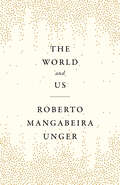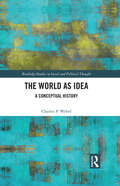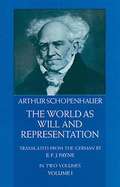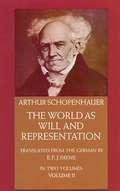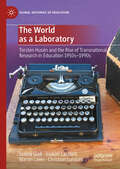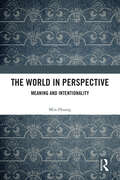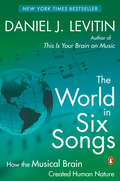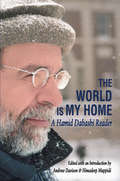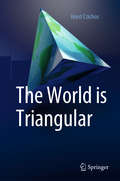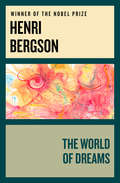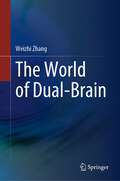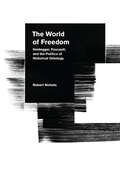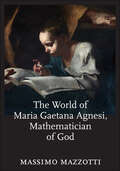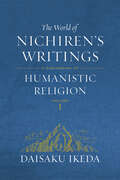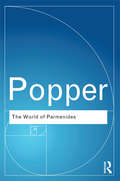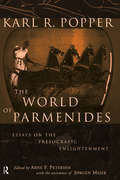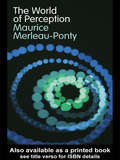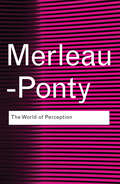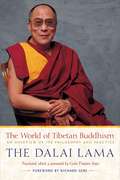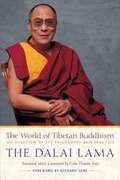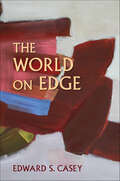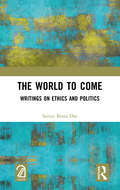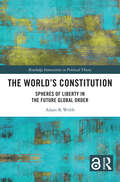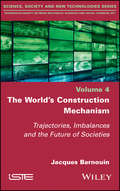- Table View
- List View
The World and Us
by Roberto Mangabeira Unger"A restless visionary striving to realize the highest aspirations of modernity itself."–New York TimesA radical re-envisioning of the human condition by the acclaimed Brazilian philosopherIn The World and Us, Roberto Mangabeira Unger sets out to reinvent philosophy. His central theme is our transcendence, everything in our existence points beyond itself, and its relation to our finitude: everything that surrounds us, and we ourselves, are flawed and ephemeral.He asks how we can live so that we die only once, instead of dying many small deaths; how we can breathe new life and new meaning into the revolutionary movement that has aroused humanity for the last three centuries, but that is now weakened and disoriented; and how we can make sense of ourselves without claiming for human beings a miraculous exception to the general regime of nature. For Unger, philosophy must be the mind on fire, insisting on our prerogative to speak to what matters most.From this perspective, he redefines each of the traditional parts of philosophy, from ontology and epistemology to ethics and politics. He turns moral philosophy into an exploration of the contest between the two most powerful contemporary moral visions: an ethic of self-fashioning and non-conformity, and an ethic of human connection and responsibility.And he turns political philosophy into a program of deep freedom, showing how to democratize the market economy, energize democratic politics, and give the individual worker and citizen the means to flourish amid permanent innovation.
The World as Idea: A Conceptual History (Routledge Studies in Social and Political Thought)
by Charles P. WebelIn The World as Idea Charles P. Webel presents an intellectual history of one of the most influential concepts known to humanity—that of "the world." Webel traces the development of "the world" through the past, depicting the history of the world as an intellectual construct from its roots in ancient creation myths of the cosmos, to contemporary speculations about multiverses. He simultaneously offers probing analyses and critiques of "the world as idea" from thinkers ranging from Plato, Aristotle, and St. Augustine in the Greco-Roman period to Kant, Schopenhauer, Nietzsche, Wittgenstein, Merleau-Ponty, and Derrida in modern times. While Webel mainly focuses on Occidental philosophical, theological, and cosmological notions of worldhood and worldliness, he also highlights important non-Western equivalents prominent in Islamic and Asian spiritual traditions. This ensures the book is a unique overview of what we all take for granted in our daily existence, but seldom if ever contemplate—the world as the uniquely meaningful environment for our lives in particular and for life on Earth in general. The World as Idea will be of great interest to those interested in the "world as idea," scholars in fields ranging from philosophy and intellectual history to political and social theory, and students studying philosophy, the history of ideas, and humanities courses, both general and specialized.
The World as Will and Representation, Vol. 1: The World As Will And Representation (The\cambridge Edition Of The Works Of Schopenhauer Ser.)
by Arthur SchopenhauerArthur Schopenhauer's Die Welt als Wille und Vorstellung is one of the most important philosophical works of the nineteenth century, the basic statement of one important stream of post-Kantian thought. It is without question Schopenhauer's greatest work. Conceived and published before the philosopher was 30 and expanded 25 years later, it is the summation of a lifetime of thought.For 70 years, the only unabridged English translation of this work was the Haldane-Kemp collaboration. In 1958, a new translation by E. F. J. Payne appeared that decisively supplanted the older one. Payne's translation is superior because it corrects nearly 1,000 errors and omissions in the Haldane-Kemp translation, and it is based on the definitive 1937 German edition of Schopenhauer's work prepared by Dr. Arthur Hübscher. Payne's edition is the first to translate into English the text's many quotations in half a dozen languages. It is thus the most useful edition for the student or teacher.
The World as Will and Representation, Vol. 2
by Arthur SchopenhauerVolume 2 of the definitive English translation of one of the most important philosophical works of the 19th century, the basic statement in one important stream of post-Kantian thought. Corrects nearly 1,000 errors and omissions in the older Haldane-Kemp translation. For the first time, this edition translates and locates all quotes and provides full index.
The World as a Laboratory: Torsten Husén and the Rise of Transnational Research in Education 1950s–1990s (Global Histories of Education)
by Martin Lawn Sotiria Grek Joakim Landahl Christian LundahlThis book covers the construction of international education research community in the 1950s-1990s, and the growth of its ‘disembedded’ laboratory i.e. networks, spaces, materiality, travelling, translations. The book follows a sociology of science theoretical framework in order to examine the research-archive of the Swedish internationally renowned educational scholar Torsten Husén (1916-2009). The archive reveals the shifting and heterogenous transnational networks that contribute to the development of social science research beyond fixed time and space dimensions, and that extends social science beyond individual ideas, researchers, environments, institutions and universities. These are practices that create, mobilise, sustain and challenge relations between actors in innovations, knowledge creation and various social activities. In other words, the archive represents the socio-material manifestation not only of the intellectual trajectory of a key education actor but the growing organisation of a whole scientific field at the time.
The World in Perspective: Meaning and Intentionality
by Min HuangThis book aims to reclaim the significance of meaning within the philosophical thinking that has evolved from Descartes and Locke through Kant, Husserl, and Frege, focusing on intentionality—the mind's directedness toward the reality.The author opens with an epistemological account of analyticity and illustrates the central role of intentionality within it. A transcendentalist view on intentionality is then adopted, in contrast with the prevalent naturalist stance. Addressing key themes in the philosophy of language—truth, representation, propositions, predication, reference, and sense— the book presents a framework for a meaning–intentionality theory, which integrates key insights from Frege, Husserl, Wittgenstein, Dummett, and Davidson.The book will appeal to scholars and graduate students of epistemology, philosophy of language, philosophy of mind, theory of meaning, and theory of intentionality.
The World in Six Songs
by Daniel J. LevitinThe author of the New York Times bestseller This Is Your Brain on Music reveals music's role in the evolution of human culture-and "will leave you awestruck" (The New York Times) Daniel J. Levitin's astounding debut bestseller, This Is Your Brain on Music, enthralled and delighted readers as it transformed our understanding of how music gets in our heads and stays there. Now in his second New York Times bestseller, his genius for combining science and art reveals how music shaped humanity across cultures and throughout history. Dr. Levitin identifies six fundamental song functions or types-friendship, joy, comfort, religion, knowledge, and love-then shows how each in its own way has enabled the social bonding necessary for human culture and society to evolve. He shows, in effect, how these "six songs" work in our brains to preserve the emotional history of our lives and species. Dr. Levitin combines cutting-edge scientific research from his music cognition lab at McGill University and work in an array of related fields; his own sometimes hilarious experiences in the music business; and illuminating interviews with musicians such as Sting and David Byrne, as well as conductors, anthropologists, and evolutionary biologists. The World in Six Songs is, ultimately, a revolution in our understanding of how human nature evolved-right up to the iPod. Read Daniel Levitin's posts on the Penguin Blog.
The World is My Home: A Hamid Dabashi Reader
by Andrew Davison & Himadeep MuppidiAs recent events indicate, Iranian, Middle Eastern, and Islamic politics more broadly have been deeply influential in world affairs. Hamid Dabashi has been a highly visible and prominent commentator on these affairs, explaining, interpreting, and providing a critical perspective. This volume gathers together his most influential and insightful writings. As one of the foremost contemporary public intellectuals and scholars of our time, Dabashi's interests and writings span subjects ranging from Islamic philosophy and political ideology to Iranian art and Persian literature, from Sufism and Orientalism to Iranian and world cinema and contemporary Arab and Muslim visual arts; and from postcolonial theory and globalization to imperialism and public affairs. There is a direct connection between his theoretical innovations and the angle of his public interventions on the urgent global issues of the day. This book brings together some of his most important writings, especially those that offer new ways of understanding Islam, Iran, Islamist ideology, global art, and the condition of global modernity. The book shows the underlying conceptual themes that unify Dabashi's wide-ranging and brilliantly insightful corpus. Dabashi combines deep knowledge of the subject matter about which he writes, and highly refined sociological, hermeneutical, and cultural interpretive skills, moving far beyond the limiting, distorted, and intellectually stifling character of reigning absolutist conventions. He places existing authoritative frameworks under close scrutiny in order to produce novel and penetrating insights. These essays reflect historical and geographical worlds that are best viewed when Hamid Dabashi's work is read as a whole, which this one- volume work makes possible for the first time.
The World is Triangular
by Horst CzichosThis book gives a short presentation of the triad philosophy–physics–technology against the background of the common origin in ancient times. The emergence of the book has been described in the foreword of the first edition. The present second edition of the book is updated and extended, whereby new physical research results and technological innovations were included: - The physics of space and time after the experimental detection of gravitational waves (Nobel Prize for Physics 2017). - The New International System of Units (SI) for Physics and Technology which is completely based on natural constants and entered into force on World Metrology Day, 20 May 2019. - Actual overview of basic technologies: Material, Energy, Information. - Technologies for the “Digital World” of information and communication. - Mechatronic and Cyber-physical systems for Industry 4.0. The significance of technology for the world in the 21st century is discussed in the final section of the book.
The World of Dreams
by Henri BergsonBergson incorporated the best of contemporary thinking in all his works. These thinkers included A. Krauss, Delage, Freud, and W. Robert. Bergson talks about how our sensory organs (eyes) are involved in dreams so that we think we perceive something but when we open our eyes it vanishes. This book is not a dictionary of dreams but a stunning example of how dreams work and function. Henri-Louis Bergson was a major French philosopher, influential in the first half of the 20th century. One of Bergson&’s main problems is to think of novelty as pure creation, instead of as the unraveling of a predetermined program. His is a philosophy of pure mobility, unforeseeable novelty, creativity and freedom, which can thus be characterized as a process philosophy. It touches upon such topics as time and identity, free will, perception, change, memory, consciousness, language, the foundation of mathematics and the limits of reason.
The World of Dreams
by Henri BergsonBergson incorporated the best of contemporary thinking in all his works. These thinkers included A. Krauss, Delage, Freud, and W. Robert. Bergson talks about how our sensory organs (eyes) are involved in dreams so that we think we perceive something but when we open our eyes it vanishes. This book is not a dictionary of dreams but a stunning example of how dreams work and function. Henri-Louis Bergson was a major French philosopher, influential in the first half of the 20th century. One of Bergson&’s main problems is to think of novelty as pure creation, instead of as the unraveling of a predetermined program. His is a philosophy of pure mobility, unforeseeable novelty, creativity and freedom, which can thus be characterized as a process philosophy. It touches upon such topics as time and identity, free will, perception, change, memory, consciousness, language, the foundation of mathematics and the limits of reason.
The World of Dual-Brain
by Weizhi ZhangThis book leaves the template of the inertia of natural human society and traditional ideological thinking, to illustrate the mechanism of the generation of the Sociality Brain and to explore the construction path of the human-computer symbiosis order. At the same time, this book proposes concepts including ‘wisdom sharing system’, ‘the Sociality Brain’, ‘dual-brain world’, ‘off-site economic civilization’, ‘basic contradictions in the intelligent world’, and ‘class analysis and division of the dual-brain world’, etc. This is a philosophical thinking about the intelligent world beyond the categories of natural human society and biological brain.
The World of Freedom: Heidegger, Foucault, and the Politics of Historical Ontology
by Robert NicholsMartin Heidegger and Michel Foucault are two of the most important and influential thinkers of the twentieth century. Each has spawned volumes of secondary literature and sparked fierce, polarizing debates, particularly about the relationship between philosophy and politics. And yet, to date there exists almost no work that presents a systematic and comprehensive engagement of the two in relation to one another. "The World of Freedom" addresses this lacuna. Neither apology nor polemic, the book demonstrates that it is not merely interesting but necessary to read Heidegger and Foucault alongside one another if we are to properly understand the shape of twentieth-century Continental thought. Through close, scholarly engagement with primary texts, Robert Nichols develops original and demanding insights into the relationship between fundamental and historical ontology, modes of objectification and subjectification, and an ethopoetic conception of freedom. In the process, his book also reveals the role that Heidegger's reception in France played in Foucault's intellectual development--the first major work to do so while taking full advantage of the recent publication of Foucault's last College de France lectures of the 1980s, which mark a return to classical Greek and Roman philosophy, and thus to familiar Heideggerian loci of concern.
The World of Maria Gaetana Agnesi, Mathematician of God (Johns Hopkins Studies in the History of Mathematics #2)
by Massimo MazzottiThe fascinating true story of mathematician Maria Agnesi.She is best known for her curve, the witch of Agnesi, which appears in almost all high school and undergraduate math books. She was a child prodigy who frequented the salon circuit, discussing mathematics, philosophy, history, and music in multiple languages. She wrote one of the first vernacular textbooks on calculus and was appointed chair of mathematics at the university in Bologna. In later years, however, she became a prominent figure within the Catholic Enlightenment, gave up academics, and devoted herself to the poor, the sick, the hungry, and the homeless. Indeed, the life of Maria Agnesi reveals a complex and enigmatic figure—one of the most fascinating characters in the history of mathematics. Using newly discovered archival documents, Massimo Mazzotti reconstructs the wide spectrum of Agnesi's social experience and examines her relationships to various traditions—religious, political, social, and mathematical. This meticulous study shows how she and her fellow Enlightenment Catholics modified tradition in an effort to reconcile aspects of modern philosophy and science with traditional morality and theology.Mazzotti's original and provocative investigation is also the first targeted study of the Catholic Enlightenment and its influence on modern science. He argues that Agnesi's life is the perfect lens through which we can gain a greater understanding of mid-eighteenth-century cultural trends in continental Europe.
The World of Nichiren's Writings, vol. 1: A Discussion of Humanism Religion
by Daisaku IkedaIn these insightful discussions, Daisaku Ikeda explores from a variety of angles the life, times, and teachings of Nichiren Daishonin as described in his writings. We learn how Nichiren' s actions— from his vows at an early age to bring happiness to the people through his fearlessness in face of life-threatening persecutions— can become a model for us today. And the humanistic interpretations of key Buddhist concepts bring new clarity to ideas such as “ attaining Buddhahood in this lifetime” and “ establishing the correct teaching for the peace of the land.” More than just history and theory, the inspiration offered here aims to provide a deeper understanding of how to put into daily practice Nichiren's philosophy of hope and victory.
The World of Parmenides: Essays on the Presocratic Enlightenment
by Karl Sir PopperWith a new foreword by Scott Austin 'I hope that these essays may illustrate the thesis that all history is or should be the history of problem situations, and that in following this principle we may further our understanding of the Presocratics and other thinkers of the past. The essays also try to show the greatness of the early Greek philosophers, who gave Europe its philosophy, its science, and its humanism.' - Karl Popper, from the preface The World of Parmenides is a brilliant exploration of the complexity of ancient Greek thought and science by one of the twentieth century’s leading philosophers. It reveals the great importance of Presocratic philosophy to Popper’s thought as a whole and shows the profound enlightenment he experienced reading not only Parmenides but the wider world of Greek science and philosophy including Xenophanes and Heraclitus. Edited by Arne F. Petersen, Associate Professor in the Faculty of Humanities, University of Copenhagen.
The World of Parmenides: Essays on the Presocratic Enlightenment (Routledge Classics Ser.)
by Karl PopperThis unique collection of essays, published together for the first time, not only elucidates the complexity of ancient Greek thought, but also reveals Karl Popper's engagement with Presocratic philosophy and the enlightenment he experienced in his reading of Parmenides. As Karl Popper himself states himself in his introduction, he was inspired to write about Presocratic philosophy for two reasons - firstly to illustrate the thesis that all history is the history of problem situations and secondly, to show the greatness of the early Greek philosophers, who gave Europe its philosophy, its science and its humanism.
The World of Perception
by Maurice Merleau-Ponty'Painting does not imitate the world, but is a world of its own.'In 1948, Maurice Merleau-Ponty wrote and delivered on French radio a series of seven lectures on the theme of perception. Translated here into English for the first time, they offer a lucid and concise insight into one of the great philosophical minds of the twentieth-century.These lectures explore themes central not only to Merleau-Ponty's philosophy but phenomenology as a whole. He begins by rejecting the idea - inherited from Descartes and influential within science - that perception is unreliable and prone to distort the world around us. Merleau-Ponty instead argues that perception is inseparable from our senses and it is how we make sense of the world. Merleau-Ponty explores this guiding theme through a brilliant series of reflections on science, space, our relationships with others, animal life and art. Throughout, he argues that perception is never something learned and then applied to the world. As creatures with embodied minds, he reminds us that we are born perceiving and share with other animals and infants a state of constant, raw, unpredictable contact with the world. He provides vivid examples with the help of Kafka, animal behaviour and above all modern art, particularly the work of Cezanne.A thought-provoking and crystalline exploration of consciousness and the senses, The World of Perception is essential reading for anyone interested in the work of Merleau-Ponty, twentieth-century philosophy and art.
The World of Perception
by Maurice Merleau-Ponty'In simple prose Merleau-Ponty touches on his principle themes. He speaks about the body and the world, the coexistence of space and things, the unfortunate optimism of science – and also the insidious stickiness of honey, and the mystery of anger.' - James ElkinsMaurice Merleau-Ponty was one of the most important thinkers of the post-war era. Central to his thought was the idea that human understanding comes from our bodily experience of the world that we perceive: a deceptively simple argument, perhaps, but one that he felt had to be made in the wake of attacks from contemporary science and the philosophy of Descartes on the reliability of human perception.From this starting point, Merleau-Ponty presented these seven lectures on The World of Perception to French radio listeners in 1948. Available in a paperback English translation for the first time in the Routledge Classics series to mark the centenary of Merleau-Ponty’s birth, this is a dazzling and accessible guide to a whole universe of experience, from the pursuit of scientific knowledge, through the psychic life of animals to the glories of the art of Paul Cézanne.
The World of Tibetan Buddhism
by Thupten Jinpa Richard Gere His Holiness the Dalai LamaWith characteristic humility, His Holiness the Dalai Lama begins this landmark survey of the entire Buddhist path by saying, "I think an overview of Tibetan Buddhism for the purpose of providing a comprehensive framework of the path may prove helpful in deepening your understanding and practice." In this book, the Dalai Lama delivers a presentation that is both concise and profound, accessible and engaging. As readers explore Tibetan Buddhism more fully than ever before, they will find in His Holiness a great friend and authority.
The World of Tibetan Buddhism: An Overview of Its Philosophy And Practice
by Dalai Lama Xiv Thupten Jinpa Richard GereIntroduces the basic beliefs of Buddhism, discusses the practices of loving and kindness, and looks at Vajrayana Buddhism and the path of tantra.
The World on Edge (Studies in Continental Thought)
by Edward S. CaseyFrom one of continental philosophy's most distinctive voices comes a creative contribution to spatial studies, environmental philosophy, and phenomenology. Edward S. Casey identifies how important edges are to us, not only in terms of how we perceive our world, but in our cognitive, artistic, and sociopolitical attentions to it. We live in a world that is constantly on edge, yet edges as such are rarely explored. Casey systematically describes the major and minor edges that configure the human and other-than-human realms, including our everyday experience. He also explores edges in high- stakes situations, such as those that emerge in natural disasters, moments of political and economic upheaval, and encroaching climate change. Casey's work enables a more lucid understanding of the edge-world that is a necessary part of living in a shared global environment.
The World to Come: Writings on Ethics and Politics
by Saitya Brata DasAt the heart of the messianic thinking lies an unconditional idea of redemption. The messianic idea of unconditionality is based upon a qualitative distinction between the unredeemed world and the world to come. It is fundamental to this messianic idea that this distinction can't be grasped as transition or mediation. Taking his inspiration from thinkers like Jacques Derrida, Emmanuel Lévinas, Walter Benjamin and Franz Rosenzweig, Saitya Brata Das renews here this task of the unconditional, the task of thinking “the advent of pure future that is always to come", unenclosed in the bounds of law or in the cages of the “worldly”. He thereby draws profound ethico-political implications from such a thought that opens up the infinitude of the future from the heart of our finitude, and shows that such thinking is the very task of our time.
The World's Constitution: Spheres of Liberty in the Future Global Order (Routledge Innovations in Political Theory)
by Adam K. WebbGlobal governance is tightening and foreshadows that world state formation will become a live political issue in this century. Some observers treat it as inevitable amid the urgency of global issues. They foresee a technocratic scaling up of the model of state authority that has prevailed at the national level for over two hundred years. Many critics and members of the public around the world look askance at that prospect. They rightly fear a moral vacuum of authority disconnected from the world’s traditions, and a concentration of power that would be damaging to liberty or even dystopian in its upshot. Still, they often merely aim to stand athwart the scaling up of political institutions, rather than actively trying to shape an alternative that can seize the global horizon.The World’s Constitution: Spheres of Liberty in the Future Global Order offers a radically different vision of future world order that could work in a global space while shifting the balance of power from state back to society. It draws on older resources in political thought, both Western and non-Western, to upend mainstream notions of statehood and sovereignty that have been taken for granted for too long in the modern era. It offers an original ‘sphere pluralist’ framework that can reconcile liberty, tradition, and cosmopolitanism. As a book rooted in the past but mindful of future constitutional and policy challenges, it bridges ideas and real-world implications, with insights that cut across a wide range of topics from migration and social welfare to personal law systems and channels of representation. It opens an exciting debate about global constitutional futures that is likely to become more salient over the next couple of generations.The Open Access version of this book, available at http://www.taylorfrancis.com, has been made available under a Creative Commons Attribution-Non Commercial-No Derivatives (CC-BY-NC-ND) 4.0 license.
The World's Construction Mechanism: Trajectories, Imbalances, and the Future of Societies
by Jacques BarnouinThe interdisciplinarity between the biological and human sciences is here to serve a daring objective: to decipher, by means of a logical chain, the explanatory factors of human trajectories and imbalances between societies and nations. To do this, The World’s Construction Mechanism is based on an unprecedented analysis of the dynamics of the human species, combining the contributions of anthropology, archeology, biology, climatology, economics, geography, history and sociology. This book analyzes the roots of societal disharmony and presents ways of realizing a clear-sighted human project that is in step with the general interest of humanity.
